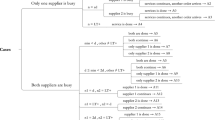Abstract
If we have two information production processes with the same h-index, random removal of items causes one system to have a higher h-index than the other system while random removal of sources causes the opposite effect. In a Lotkaian framework we prove formulae for the h-index in case of random removal of items and in case of random removal of sources. In conclusion, we warn for the use of the h-index in case of incomplete data sets.

Similar content being viewed by others
References
Banks, M. G. (2006). An extension of the Hirsch-index: Indexing scientific topics and compounds. Scientometrics, 69(1), 161–168.
Braun, T., Glänzel, W., & Schubert, A. (2005). A Hirsch-type index for journals. The Scientist, 19(22), 8–10.
Braun, T., Glänzel, W., & Schubert, A. (2006). A Hirsch-type index for journals. Scientometrics, 69(1), 169–173.
Burrell, Q. L. (2011). Private communication.
Egghe, L. (2005). Power laws in the information production process: Lotkaian informetrics. Oxford: Elsevier.
Egghe, L. (2008a). The influence of transformations on the h-index and the g-index. Journal of the American Society for Information Science and Technology, 59(8), 1304–1312.
Egghe, L. (2008b). Examples of simple transformations of the h-index: Qualitative and quantitative conclusions and consequences for other indices. Journal of Informetrics, 2(2), 136–148.
Egghe, L. (2010a). The Hirsch-index and related impact measures. In B. Cronin (ed.), Annual review of information science and technology (Vol. 44, pp. 65–114). Medford: Information Today, Inc.
Egghe, L. (2010b). Influence of adding or deleting items and sources on the h-index. Journal of the American Society for Information Science and Technology, 61(2), 370–373.
Egghe, L. (2010c). A disadvantage of h-type indices for comparing the impact of two researchers. Research Evaluation (to appear).
Egghe, L. (2010d). Mathematical derivation of the scale-dependence of the h-index and other h-type indices. Scientometrics, 87(2), 287–292.
Egghe, L., & Rousseau, R. (2006). An informetric model for the Hirsch-index. Scientometrics, 69(1), 121–129.
Henzinger, M., Suñol, J., & Weber, I. (2010). The stability of the h-index. Scientometrics, 84(2), 465–479.
Hirsch, J. E. (2005). An index to quantify an individual’s scientific research output. Proceedings of the National Academy of Sciences of the United States of America, 102(46), 16569–16572.
van Raan, A. F. J. (2006). Comparison of the Hirsch-index with standard bibliometric indicators and with peer judgment for 147 chemistry groups. Scientometrics, 67(3), 491–502.
Acknowledgment
The author is grateful for the constructive suggestions of two referees. More in particular I thank Prof. Q.L. Burrell for the permission to add the “important remark” after the third section.
Author information
Authors and Affiliations
Corresponding author
Rights and permissions
About this article
Cite this article
Egghe, L. The influence of random removal of sources and items on the h-index. Scientometrics 88, 363–370 (2011). https://doi.org/10.1007/s11192-011-0411-0
Received:
Published:
Issue Date:
DOI: https://doi.org/10.1007/s11192-011-0411-0




